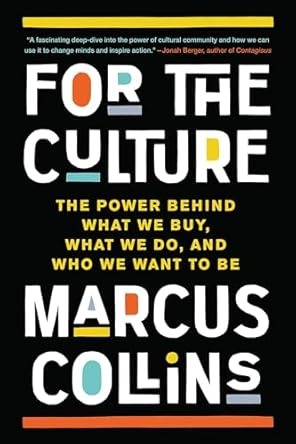
If you work in design, branding, strategy, marketing, or business building (in any way), this book is for you.
"For The Culture" by Marcus Collins delves into the profound influence of culture on our daily decisions, behaviors, and even our identity. Collins, a seasoned marketer with a background in working with high-profile brands like Beyoncé and Apple, uses his book to explore how marketers and businesses can engage with consumers on a deeper level by contributing to and participating in cultural movements rather than just selling to them. He argues that understanding and aligning with a culture's values can lead to more impactful marketing and brand loyalty, as seen in his examples like Pabst Blue Ribbon's adoption by hipsters, representing autonomy and self-expression.
The book is not just about marketing; it's a broader commentary on how culture shapes our world. Collins integrates personal anecdotes with broader market phenomena to illustrate how cultural engagement can spark social movements, influence political ideologies, and drive consumer behavior. He emphasizes the importance of marketers being sensitive to the cultural narratives they engage with, using examples like Nike's support for Colin Kaepernick, which, despite being controversial, resonated deeply with certain cultural values, thereby enhancing brand loyalty among those who shared those values.
Collins also critiques instances of cultural engagement gone wrong, pointing out the dangers of misreading the cultural room or imposing external narratives on communities. His discussion of the Budweiser "Wassup" campaign and its cultural impact versus a misstep like the "white savior" narrative in advertising highlights the fine line marketers walk between engagement and exploitation. This part of the book serves as a cautionary tale on the responsibilities of those who wield cultural influence.
"For The Culture" encourages a shift in how we view business and marketing activities. Instead of viewing culture merely as a market to be tapped, Collins promotes a model where businesses contribute meaningfully to cultural dialogues, thereby fostering genuine connections with consumers. This approach not only enriches consumer-brand relationships but also contributes positively to societal culture, encouraging diversity, inclusion, and thoughtful engagement with cultural identities.
In essence, Marcus Collins's book is a call to action for businesses and individuals alike to engage with culture not just as consumers but as active participants. By doing so, they can improve the cultural landscape in which they operate, making "For The Culture" not just a guide for marketing professionals but a manifesto for anyone interested in the intersection of culture, business, and personal identity in our globalized world.



Write A Comment